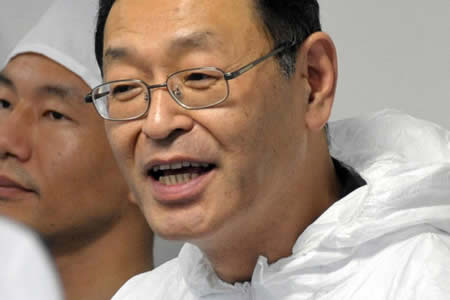Cancer kills Fukushima boss who stayed at post
 0 Comment(s)
0 Comment(s) Print
Print E-mail Agencies via Shanghai Daily, July 10, 2013
E-mail Agencies via Shanghai Daily, July 10, 2013
|
|
|
Masao Yoshida, centre, had worked for TEPCO for since 1979.[File photo] |
The former boss of Japan's Fukushima nuclear plant, who stayed at his post to try to tame runaway reactors after the 2011 tsunami, died of cancer yesterday, the operator said.
Masao Yoshida, 58, was at the power station on March 11, 2011, when waves swamped cooling systems and sparked meltdowns that released plumes of radiation.
Yoshida led the subsequent effort to get the crippled complex under control, as workers battled frequent aftershocks to try to prevent the disaster worsening.
Government contingency plans revealed after the event showed how scientists feared a chain reaction if Fukushima spiralled out of control, a scenario that could have meant evacuating Tokyo.
Yoshida's selfless work is contrasted in the public mind with the attitude of his employers, who seemed willing to abandon the complex and are popularly believed to have shirked their responsibility.
"He died of oesophageal cancer at 11:32am today at a Tokyo hospital," said a spokesman for plant operator Tokyo Electric Power (TEPCO) yesterday.
Yoshida left the plant soon after being suddenly hospitalized in late November 2011.
TEPCO has said his cancer was unlikely to be linked to radiation exposure in the months after the disaster. The company has said it would take at least five years and normally 10 years to develop this particular condition if radiation exposure were to blame.
Following surgery for cancer, Yoshida suffered a brain hemorrhage and had another operation in July 2012, TEPCO said.
Yoshida was still employed by TEPCO at the time of his death.
The disaster saw three reactors go into meltdown, spewing radiation into the air, sea and food chain.
No deaths have been directly attributed to the radiation released by the accident, but it has left large areas of land uninhabitable.
The plant itself remains fragile. TEPCO said yesterday radioactive substances in groundwater have rocketed over the past three days and engineers did not know where the leak was coming from.
Scientists say decommissioning the plant could take 40 years.







Go to Forum >>0 Comment(s)